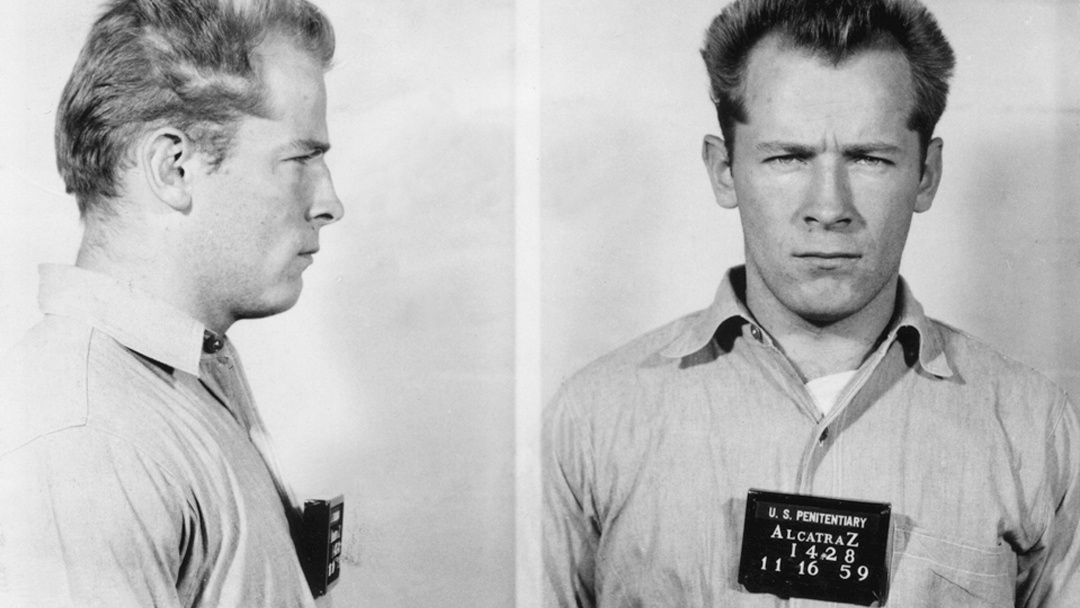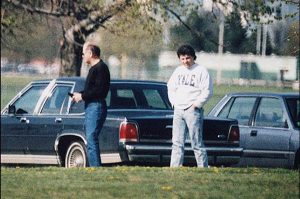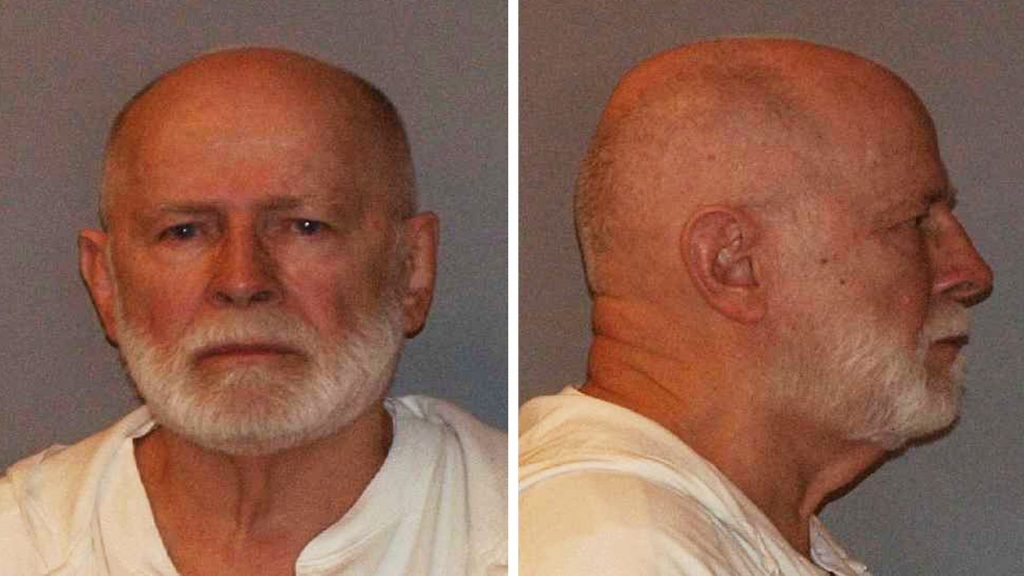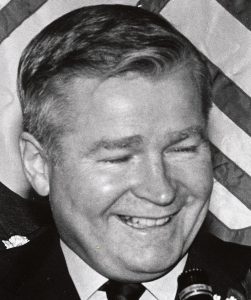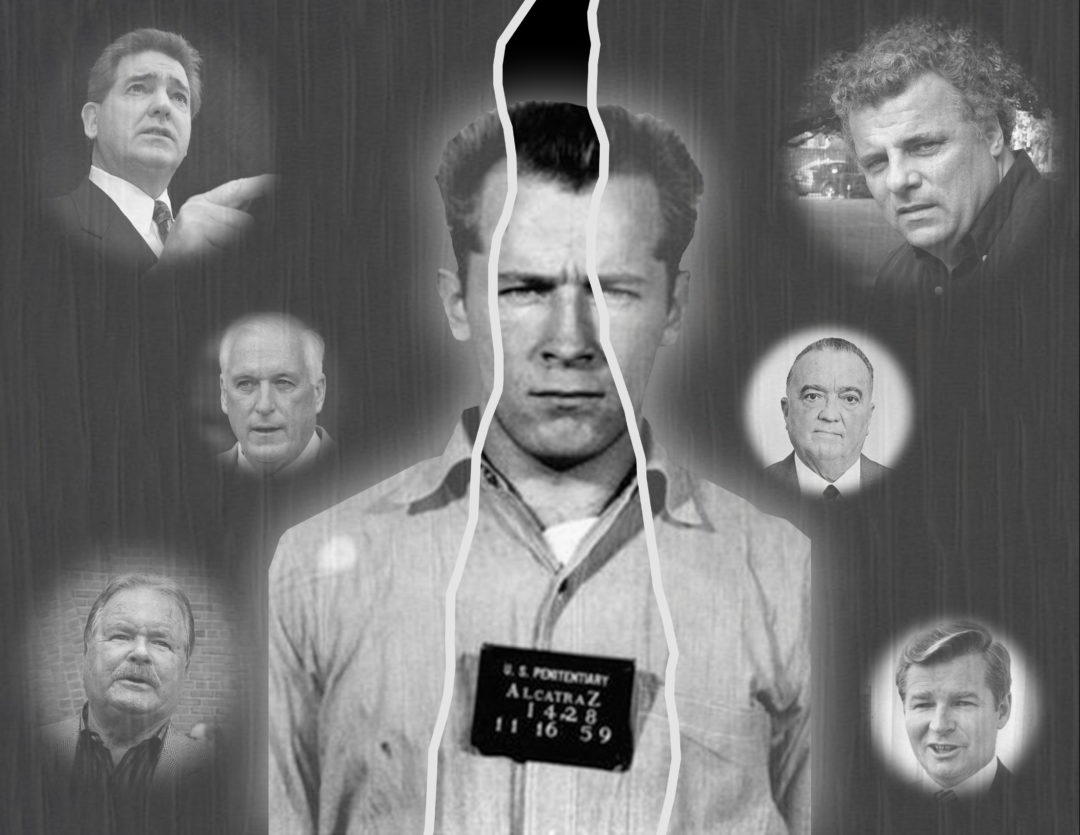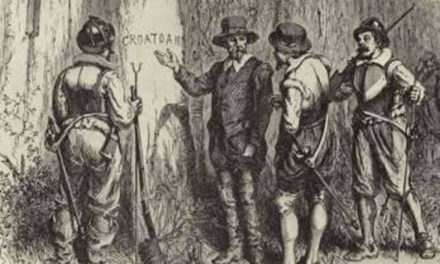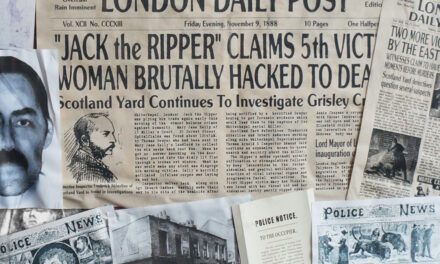Whitey Bulger
It wouldn’t really be a disaster if “the clowns were running the circus,” somewhere. Our society could probably survive a corrupted circus. But when criminals run law enforcement organizations, the outcomes can be very sinister.
Beginning in the 1960’s, Irish Mob gang leader James J. ‘Whitey’ Bulger rose to power and dominated the Boston underworld like no one has before, or since. Extremely sly and extremely brutal, he blended the two key ingredients to maintain power in the jungle of organized crime. Among his triumphs: he conned the Justice Department officials in the area, and the local FBI, into giving him ongoing immunity for years. In return he gave them some, limited help in nailing rival gangs, increasing his own power and dominance of crime in the region, while he murdered by the dozens.
When his high-wire act could be sustained no longer and his fall was imminent, FBI agent John Connolly tipped him off and he disappeared, for sixteen years, until his arrest in California in 2011. He’s since been convicted and shipped off for life, but the courtroom scene wasn’t pretty. It revealed countless accusations, and counter-accusations, of low and duplicitous dealing between and among law enforcement, prosecutors, and criminals. After putting Whitey away for good, the DOJ response was to prosecute 76-year-old FBI whistleblower Robert Fitzpatrick for perjury, after his damning testimony about perceived FBI complicity with Bulger years ago. The Fitzpatrick prosecution appears, at least on the surface, to be ugly retribution, reminiscent of the Hoover era, for anyone who speaks ill of the FBI brethren.
So the mystery is multi-faceted. In the street vernacular, just what the hell happened in the twisted case of Whitey Bulger versus the Department of Justice?
A VERY AMERICAN STORY
James (Whitey) Bulger, the mobster who terrorized South Boston in the 1970s and ‘80s, holding the city in his thrall even after he disappeared, was convicted Monday of a sweeping array of gangland crimes, including 11 murders. He faces the prospect of spending the rest of his life in prison.
The verdict delivers long-delayed justice to Mr. Bulger, 83, who disappeared in the mid-1990s after a corrupt agent with the Federal Bureau of Investigation told him he was about to be indicted. He left behind a city that wondered if he would ever be caught — and even if the F.B.I., which had been complicit in many of his crimes and had relied on him as an informer, was really looking for him.
“This was the worst case of corruption in the history of the F.B.I.,” said Michael D. Kendall, a former federal prosecutor who investigated Mr. Bulger’s associates. “It was a multigenerational, systematic alliance with organized crime, where the F.B.I. was actively participating in the murders of government witnesses, or at least allowing them to occur.”
NY Times, Katherine Q. Seelye, August 12, 2013
The dramatization of Bulger’s career, starring Johnny Depp, is well worth seeing. Depp is so cold and chilling, he would have scared the real Bulger spitless.
But here’s the thing about Bulger, besides the personality of a gangster that could terrify God. He also functioned, for almost two decades no less, as essentially under the protection of the FBI, almost as a strong-arm division of the Bureau itself.
It’s with only a little hyperbole that former prosecutor Kendall called it the worst corruption in FBI history (and it would have been except for the most wretched excesses of the founding Director, Hoover).
So that’s the first level of mystery, how in the name of law and order did things get so far out of hand, did the FBI, in effect, hand over numerous victims for murder?
How, once the roof collapsed in 1994 and Bulger went on the lamb (with an FBI tip-off) did one of the most wanted men, ever, stay invisible for over fifteen years, hidden in plain sight?
What did Billy Bulger, once president of the Massachusetts Senate, know, and when did he know it?
And were John Connelly, and especially whistle-blower Robert Fitzpatrick, the guiltiest actors of the bunch, or just sacrificial lambs in the worst post-Hoover scandal of the agency?
THE STORY OF CORRUPTION
It’s another one, another of those true mystery cases that sounds like a cheap, over- the-top action novel for airplane reading. It would never happen in real life, not all of this.
You can have the biggest politician in a state have a brother who’s the biggest gangster, the FBI openly assisting serial murderers, you could have bodies with teeth yanked out by pliers and cleverly buried down in the swamps at low tide, hidden under water almost forever. You can have all this happen in a jazzy novel, pure entertainment, although of course it would never happen in real life.
Except that in Boston, through the 70’s and 80’s until Bulger disappeared in December of 1994, it did happen. Every word of it, every bit of it, and more.
Former FBI supervisor John Morris thought he had left his sordid relationship with James “Whitey” Bulger back in Boston along with the envelopes of money, the cases of expensive wine, the home-cooked meals he had prepared for the accused mob boss.
“I wanted to break as many ties as I could with Boston,” Morris told a federal court in Boston today. He transferred to FBI headquarters at Quantico, Va., and thought it was over.
Then the phone rang one night when Morris was working late. It was 1995 and Bulger had become a fugitive from justice, tipped off to a pending indictment by Morris’ FBI underling, special agent John Connolly, who was also his best friend.
In the days before he picked up the phone, Morris testified, he had received messages from a “Mr. White.” But Morris never thought he would hear the voice of the accused assassin.
But it was Bulger on the phone. And he was livid. A Boston newspaper had reported that Bulger was a longtime FBI informant, and Bulger wanted Morris to have the story retracted.
“He told me he wanted me to use my Machiavellian mind to contact my sources at the Globe to get them to retract the story about him being an informant,” Morris told the court. “If I didn’t, he said, ‘Remember the box.’”
Morris knew the reference, he said on the stand. It was about $1000 in an envelope stuffed into a wooden box that contained imported wine, among the countless bribes Morris accepted from Bulger and another FBI informant, Stephen “The Rifleman” Flemmi.
“He said if he was going to jail,” Morris told the court, “I was going with him.”
“Did you feel threatened after that call?” federal prosecutor Fred Wyshak asked Morris.
“Definitely,” Morris he answered. In fact, the stress from the call caused Morris to go into “full cardiac arrest” a short time later.
ABC Michelle McPhee, June 27, 2013
Only Whitey Bulger would think he still had clout, still had plays to make, after 15 years on the lam, and a reputation as a thug that grew oversized in his absence. You can almost admire the sheer gall of the guy, he’s got game.
Yes, corruption so thorough and rotten in the Boston office of the FBI that had it been an apple, it would have been mush in your hands.
Agent John Connelly, under Morris’s supervision, was running Bulger as an informant, but it was mostly Bulger who was being informed.
Bulger was told when other police agencies had surveillance going on him, so he could adjust.
He was told about competing criminal organizations, so he could out-maneuver them.
And he was told when someone was “ratting” on his organization, so he could have them killed. That may not have been the FBI’s intent with passing on information to Whitey about betrayals.
But they had to know they were handing out death sentences.
Connelly and Morris grew wealthier than their government salaries would justify, and no one doubts where the money came from.
They had big dreams. Connelly also had the ear of political super-star Billy Bulger, the brother, and thus had dreams of retiring from the Bureau to the role of….Chief of Police of the City of Boston.
Think of it, retirement salary from the FBI, a Police Chief’s salary, and God knows what other illicit streams of cash he had planned. He would dip his snout in every trough around.
But worst of all was an upending of the process, the creation of a surreal world where the FBI were no longer the people to keep you safe, but just as likely the people to give you up and get you killed.
It was a stain that takes time to wash away.
He was speaking primarily to the Donahue family of Boston, his words fell on deaf ears.
“His tears and his apologies don’t mean crap to me or my family, not one bit,” said Tommy Donahue after court wrapped up for the day. “I thought it was a complete joke. He can actually take his apology and shove it.”
WBZ-TV, Jim Armstrong, July 1, 2013
Morris at least admitted it, in open court, in front of God and everybody. Because his office was so busy being corrupt, several innocent people were dead.
MYSTERIES LEFT BEHIND
Large enough mysteries and scandals spawn their own smaller mysteries, just like hurricanes can spawn tornadoes. The inquisitive mind, looking at the whole remarkable Bulger debacle, will ask: now what the devil is this Robert Fitzpatrick angle? What’s up with him, is he for real?
It’s a story he repeated when testifying for the defense at Bulger’s 2013 trial — except there he embellished the tale…On Monday, Fitzpatrick admitted it was all a lie. Now 76 and in ailing health, Fitzpatrick took the stand in federal court in Boston and pleaded guilty to six counts of perjury and six counts of obstruction of justice for his testimony at Bulger’s trial. “I am guilty,” said Fitzpatrick…Under a plea agreement, the government recommended that Fitzpatrick be fined $12,500 and placed on probation for two years. If US District Judge F. Dennis Saylor IV rejects the request for probation, then Fitzpatrick may withdraw his plea. Sentencing is scheduled for Aug. 5.
Shelley Murphy, The Boston Globe, May 16, 2016
One of the most damaging witnesses in the disastrous theater that played out for the Department of Justice in 2013 in Boston’s Federal Court was one Robert Fitzpatrick, by then long retired from the FBI and author of the hard-hitting “Betrayal: Whitey Bulger and the FBI Agent Who Fought to Bring Him Down.”
Hard-hitting may be a mild word for the book, more nearly heart-attack producing, at least for top administrators of the FBI or DOJ whose job is the care and polishing of the agency’s reputation. In every page of the book, Fitz postures himself as a boy scout among cynical agents, someone who takes “Fidelity, Bravery, and Integrity” as Bureau creed just as seriously as the Pope takes Mass.
But surrounding him, among those charged with setting law enforcement standards for a nation, was a culture that was a third honest law enforcement, a third politics and public relations, with a final third comprised of simple human frailty and greed. The results he says were deadly, destructive to good law enforcement, to innocent lives, and ultimately to the Bureau’s standing.
Yes, the Bureau’s reputation. It’s now well documented that during Hoover’s era, the greatest sin any agent could commit was to impugn the FBI’s reputation, considered the same as the reputation of Hoover himself. By 1972 J. Edgar was gone and the Bureau’s culture evolving, but according to Fitzpatrick at least, the theme of guarding the Bureau’s image remained a pillar of faith in the organization. Those who sullied that reputation found a dark place on a second, informal “ten most wanted list.”
Fitzpatrick and his book pulled no punches–after the body of snitch John McIntyre (murdered by Bulger in the 1980’s) surfaced, he was on national television with the following comments:
‘Yes.’.
Critical statements with that level of bite were more the rule than the exception in his remarkable memoirs.
Fitzpatrick was certainly correct that Bulger’s criminal organization had run amok with de facto FBI protection, and he was probably right that several federal agents were no better than criminals themselves.
The wisdom, however, of writing a book that might as well have been titled “Me Against a Corrupt FBI” is dubious. It’s going to win you no love from the Justice Department, or from thouands of retired agents who hope to have second careers partly based on the status of the FBI. The First Amendment being what it is, there may not have been much they could do about the book.
But when Fitzpatrick took the oath in court in the Bulger case, he put a huge target on his back. Anything he said that was not precisely factual, for that matter anything said that a later witness might contradict, would open him up to perjury charges.
He should have known and considered that as he crafted the book with his ghostwriter. And as he agreed to testify, against the government in effect, before a phalanx of able and clever U.S. Attorneys. Now, Fitz, under oath, the things you say can and will be held against you.
How much of Fitzpatrick’s reminiscences are true, how many exaggerated, or outright bunk?
At MindOverMystery we’re not sure, but we suspect the overall thrust of what he had to say about FBI Boston, 1980’s, was actually right on.
There’s so much corroboration from so many directions, other law enforcement and the like. Yes, the Boston office had suffered a horrible rot, and higher ups played a cynical politics at best to let it continue. He may have strained credulity a little with his boyscout heroe-among-thugs portrait of his FBI years (his professional ghostwriter served him poorly), but the events were probably built on more truth than falsehood.
In the end, James Fitzpatrick committed the worst infraction of all, and he’d warned about it in the book over and over–“don’t embarrass the Bureau.” He embarrassed the FBI and by extension the Department of Justice, and then walked into a trap. For a bright guy it was a dumb thing to do.
And the motivation to prosecute a 76-year-old man, with failing health, long after his law enforcement career? Wouldn’t you have loved to be a fly on the wall as decision-makers at Justice weighed the pros and cons? They hated, like walking across glass shards in bare feet, to have to drag all that corruption through open court in Bulger’s trial, just to put Whitey away. No doubt they rejoiced when Bulger was sentenced, court could adjourn, and the topic in the daily news could change.
So why rake it all open again to prosecute, some would say persecute, old man Fitzpatrick? Officially they said, to remind everyone how sacred the truth under oath is, to punish even exaggeration. But witnesses downplay, exaggerate, brag, or lie in court every day of the week, and perjury charges are relatively rare. And when two witness remember something differently, who’s to say which statements should be labeled “perjury?” We ask the input of the Boston legal community on this one, perhaps retired U.S. Attorneys will weigh in, anonymously.
Kevin Cullen, a Boston Globe columnist who sat through it all in court, thought Fitzpatrick rather a pathetic sight, caught in one foolish statement after another. Yet even he shared our doubts about the fairness of it all, and questioned the DOJ’s motivation.
And then there was that agent who told me in 1988 that I’d be murdered if the Globe Spotlight Team exposed Whitey Bulger as an FBI informant. That charming guy was never charged with anything and is still cashing his big fat FBI pension.”
Kevin Cullen, The Boston Globe, April 30,2015
We can’t help wondering, did Fitzpatrick fly just a little too close to the sun, in this case to inconvenient truth, and need to be melted down a little, as a warning to others?
You be the judge.
